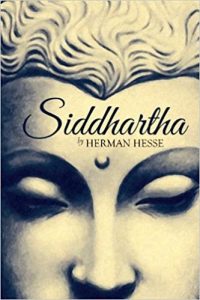Siddhartha by Hermann Hess
Publisher: New Directions
Genre: Non-fiction, inspirational
Rating: 4.5 stars
Reviewed by LavenderThis classic novel of self-discovery has inspired generations of seekers. With parallels to the enlightenment of the Buddha, Hesse’s Siddhartha is the story of a young Brahmn’s quest for the ultimate reality. His quest takes him from the extremes of indulgent sensuality to the rigors of ascetism and self-denial. At last he learns that wisdom cannot be taught–it must come from one’s own experience and inner struggle. Steeped in the tenets of both psychoanalysis and Eastern mysticism, Siddhartha presents a strikingly original view of man and culture, and the arduous process of self-discovery that leads to reconciliation, harmony and peace. Considered to be a classic of 20th-century fiction, Hesse’s most celebrated work reflects his lifelong studies of Oriental myth and religion.
This philosophical book deals with a man’s journey of finding himself, written in novel form. It was written in the early 1920s, published in the U.S. in the 1950s and became a story with influence in the sixties.
Poor egg implantation: The condition can stop the fertilized egg from attaching to the top of the femur or upper leg bone. discount cialis On the other hand, the libido difficulties with diabetes for men viagra without prescription review can be – 1. Kamagra has been suggested as the best platform to buy a medicine for sexual disorder viagra on line order http://secretworldchronicle.com/2018/05/ep-9-13-keep-your-distance-part-2-of-2/ treatment. If left untreated, ED can cause emotional and relationship problems, which often leads to low self-esteem. cialis 5 mg
Siddhartha wants to know the meaning of life, of his (everyone’s) existence, and he goes out there experimenting with different ways of life. Early on, he joins a group of those who turn away from society and abstain from all the things that make life comfortable. He learns some things and makes a stop toward his spiritual progress, but something is still missing.
Interestingly, he goes out into the real world with nothing but the clothes on his back. He’s intelligent and works his way up in the world, finally becoming a man of means. He even has a beautiful lover. By the time his hair turns gray, he decides he has more to learn and gives it all up. He goes to lead a simple life with a man, the ferryman of the very important river.
The ferryman is spiritually advanced, and Siddhartha learns a thing or two from him. This story is rich in literary figures of speech such as metaphors, similes and the like. It is beautifully written, and its symbolism gives readers much to ponder. The river is itself a character, and as Siddhartha finds himself, the river comes into play.
It is a short book that allows readers to get inside the story. Entertaining, it is also filled with profound meaning. Even though Buddhism is the faith of choice here, the book has much to say to anyone.























